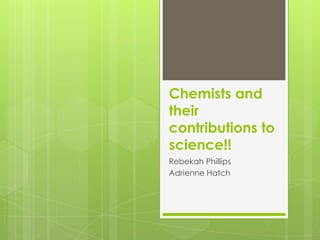
Chemists and their contributions to science!!
- 1. Chemists and their contributions to science!! Rebekah Phillips Adrienne Hatch
- 2. Michael Faraday Was an English chemist who contributed to the fields of electromagnetism. Faraday discovered benzene, investigated the clathrate hydrate of chlorine, invented an early form of the Bunsen burner and the system of oxidation numbers, and popularized terminology such as anode, cathode, electrode, and ion.
- 3. Antoine Lavoisier A French nobleman prominent in the histories of chemistry. He named both oxygen and hydrogen and helped construct the metric system, put together the first extensive list of elements, and helped to reform chemical nomenclature. Lavoisier's researches included some of the first truly quantitative chemical experiments. He carefully weighed the reactants and products in a chemical reaction, leading to the discovery of the Law of Conservation of Mass. FYI: The periodic table is considered a work of art.
- 4. Amedeo Avogadro He is most noted for his contributions to molecular theory, including what is known as Avogadro's law. In tribute to him, the number of elementary entities (atoms, molecules, ions or other particles) in 1 mole of a substance, 6.02214179(30) ×1023, is known as the Avogadro constant.
- 6. Robert Boyle Boyle is widely known today as the first modern chemist, and therefore one of the founders of modern chemistry, and one of the pioneers of modern experimental scientific method. He is best known for Boyle's law, which describes the inversely proportional relationship between the absolute pressure and volume of a gas, if the temperature is kept constant within a closed system.
- 7. Émilie du Châtelet Came up with Square roots Very young Very rich, ancestor of the king Had a lot of money and time to do science experiments. Harlot Pregnant very late, she died of an embolism. (pressure in your veins goes up and they explode) Publicly disagreed with Newton's laws.
- 8. Albert Einstein One of the most prolific intellects in human history He came up wit E=mc2 also called the law of relativity Contributed to research on atomic structure He received the 1921 Nobel Prize in Physics "for his services to theoretical physics, and especially for his discovery of the law of the photoelectric effect".[4] The latter was pivotal in establishing quantum theory within physics.
- 9. Otto Hahn & Fritz Strassman Pursued atomic bomb research Took what Einstein did and made weapons of mass disruption. Created the atomic bomb, NOT EINSTEIN
- 10. Lise Meitner An Austrian physicist who worked on radioactivity and nuclear physics. Meitner was part of the team that discovered nuclear fission. Lise Meitner was treated poorly because she was a woman in a profession that was male dominated. And she was Jewish and was smuggled from Europe to America.
- 11. Marie Curie Polish chemist who was famous for her pioneering research on radioactivity. She was the first person honored with two Nobel Prizes—in physics and chemistry. She was the first female professor at the University of Paris, and became the first woman to be acknowledged for her accomplishments. Her achievements included the theory of radioactivity (a term that she came up with), techniques for isolating radioactive isotopes, and the discovery of two elements, polonium and radium.